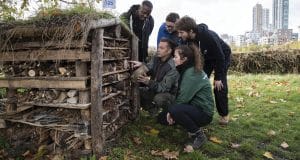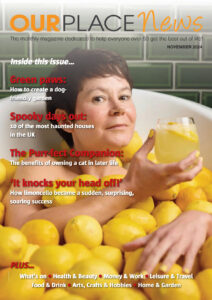The TV presenter is fronting a campaign by RSPB, The Wildlife Trust and The Woodland Trust.

UK households could give nature a massive boost by seeing their gardens, balconies, patios and windowsills as potential wildlife sanctuaries, according to the television presenter Chris Packham.
Planting trees, installing ponds – however small – and building ‘bug hotels’ from leaves and wood are among 10 measures people can take that would work wonders for biodiversity, he said.
A major study published last month revealed that 41 per cent of UK species have declined since the 1970’s as the expansion of farming has sharply reduced the amount of suitable habitats and climate change has made conditions tougher.
And new government figures, released today, showed birds which breed and feed on the 75 per cent of UK land which is farmed have seen declines of 55 per cent since 1970’s.
24 million gardens in UK
But with an estimated 24 million gardens covering an area the size of Suffolk, households can make a significant contribution to restoring the country’s depleted nature, according to a new campaign, led by Mr Packham, in conjunction with the RSPB, the Wildlife Trust and the Woodland Trust.
“There is always a perception that wildlife prospers more profitably outside of suburban and urban areas. But we know in fact that it can do very well inside these areas and that people can make a real difference,” said Mr Packham.
“At the same time, the countryside is an increasingly difficult place to look after wildlife because of intensive agriculture, ongoing development, climate change and loss of habitat. As we continue to grow our population, build more houses and hopefully create more gardens, they could become a significant new source of wildlife,” he said.
Houses without gardens, meanwhile, can do their bit by loading their balconies and windowsills with wildlife as every little bit helps.
Wildlife thrive in connected habitats
That said, the bigger the area given over to wildlife the better – and where possible, people should encourage their neighbours to follow suit as nature prospers more when it has more ‘connected’ space to roam, according to the campaign.
If households only do one thing, where possible they should create a pond, Mr Packham suggests.
“There’s very often a misconception with ponds. People think a pond very often has to be a lake. But if you stick a bucket into your garden, or a baby’s bath, or a bowl and keep it topped up with water it will make a difference.”
A pond doesn’t have to be big
“I remember we had a baby’s bath sunk into our garden, which filled with tadpoles, rat tailed maggots and mosquito larvae. I was always at its edge with a bowl and spoon teasing those things out, trying to work out what they were and what they were doing and generally marvelling at them. It doesn’t have to be big to be beautiful when it’s a pond.”
Mr Packham’s call is made to coincide with the 25th anniversary of the National Lottery, which has invested more than £800 million in wildlife projects, such as the Woodbury Wetlands in Hackney, since it began. He said that investment had played a key role in the battle to preserve biodiversity in the UK.
Chris Packham’s ten tips for turning your garden into a wildlife sanctuary
1.Grow your plants in containers to maximise space: If you only have a small outdoor space, growing plants in containers and hanging baskets is a great solution for a balcony or windowsill.
2.Choose the perfect plants for urban gardening: Climbers, like ivy, make the most of the space in a small garden and are a great source of habitat. Or if you want some colour, Sedum plants have flowers, are hardy and bees love them.
3.Build a bug hotel: Create a multi-storey wildlife hotel from natural materials like twigs, leaves and wood – providing safe hidey-holes for anything from ladybirds, to solitary bees, to bumblebees and more.
4.Reach for the skies: Make the most of the space you have by taking your urban gardening vertical. Stack planters and hanging baskets or use a wall pocket which can incorporate a range of plants of all shapes and sizes.
5. Grow herbs and vegetables: Herbs and vegetables are great for us and for wildlife. Many are compact so do not take up much space, can be grown in containers and can be whipped into a meal in seconds. Bees will thank you for planting herbs such as mint and thyme.
6. Join a community group in your area: If you live in an urban area, volunteer in a local community project to improve and enhance wildlife in your public spaces. National Lottery funded projects such as Keeping It Wild run a number of activities across the capital to empower and inspire young people to conserve and enjoy the city’s wild spaces.
7. Open your outdoor space as a bird café: Kick off by making your own bird cake or feeders and don’t forget to provide water in a shallow container for drinking and bathing – then sit back and enjoy their antics. Clean your bird feeders regularly to help keep your garden birds safe from disease.
8. Don’t hurt the wider world with your gardening: Choose peat-free compost or make your own, limit your carbon footprint and water use, and keep plastic use to a minimum so that your garden benefits the planet as a whole.
9. Fill your outdoor space with plants: And then more plants: Climbers, flowers, bushes, trees – the more you can fill any space you have – whether it’s a window box or a garden – the better. Plants offer shelter and food and are the foundation for every wildlife-friendly space.
10. Pledge to plant: Woods, hedges and green spaces buffer existing habitats, tackle climate change and reverse wildlife decline. So why not join The Woodland Trust’s Big Climate Fightback and be one of a million people pledging to plant a tree on 30th November 2019.
(Story source: Inews)

